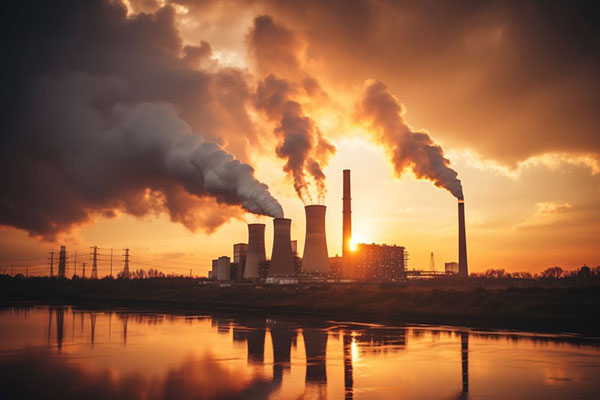Global manufacturers could collectively reduce 800 megatons of harmful emissions in a year by using AI today.
Let’s celebrate Earth Day with meaningful action. Imagine the impact we could achieve if the global manufacturing sector embraced AI starting today. By adopting AI to achieve more circular production processes, we’re not just talking about making a difference – we’re actually doing it.
66% of the world’s emissions are generated by manufacturers in the steel, cement, chemicals, and petroleum sectors. By Earth Day 2025, these manufacturers could cut down harmful emissions by 800 megatons, which is more than Germany’s entire annual emissions footprint.
Since Earth Day last year, there has been notable progress to drive forward climate change including the recent $6B funding from the Biden/Harris Administration to help decarbonize America’s manufacturing sector. The European Union’s Carbon Border Adjustment Mechanism (CBAM) tariffs. The German government’s 4 billion Euros grants for industrial decarbonization. In addition to the “beginning of the end” statement by delegates at COP28 signaling steps toward transitioning from the fossil fuel era. These transitions will each require a combination of solutions and which makes the funding a great step forwards.

However, AI can benefit all of these projects to accelerate decarbonization. AI will reduce the amount of industrial heat wasted, minimize out of spec production while transitioning technologies, and speed up the technology transition itself to get high efficiency plants running as quickly as possible.
The benefits of AI for industrial decarbonization are vast:
Achieving wholesale decarbonization through solutions like complete process electrification or carbon capture and storage often encounters challenges in scalability. However, waiting for these solutions to mature at an industrial scale is not an option for manufacturers keen on reducing their emissions. Instead, they must embrace immediate strategies to mitigate their environmental impact, with AI emerging as a pivotal ally in this endeavor.
AI’s prowess in decarbonization lies in its ability to optimize manufacturing processes, thereby curbing energy consumption, wasted materials and emissions. When a plant is able to reduce raw materials consumption, they’re reducing Scope 3 emission in addition to reducing how much money they’re spending for raw materials.
Consider the scenario of batch processing in a facility. Through sophisticated AI, engineers can quickly pinpoint inefficiencies within their operations. By example, if a plant can process a batch for one hour less, that positively impacts Scope 2 emissions, but also amplifies throughput by enabling the production of more batches in the same timeframe.
Furthermore, AI-driven optimization doesn’t merely benefit environmental sustainability—it also delivers substantial cost efficiencies. By streamlining production processes, AI minimizes resource utilization, leading to significant savings in raw material and energy costs. This dual impact of emission reduction and cost optimization positions AI as a game-changer in the journey towards decarbonization within process manufacturing.
AI-powered industrial use case examples and expected decarbonization returns:
While large-scale decarbonization solutions are still in the pipeline, process manufacturers can take proactive measures today by leveraging AI to drive efficiency, mitigate emissions, and enhance profitability.
By starting now to embrace more profitable circular practices, heavy-emitting manufacturers could achieve something incredible before Earth Day 2025. Let’s start this positive journey today by taking action which paves the way for a more circular and sustainable future.

About the Author:
Alp Kucukelbir, Ph.D., is the chief scientist and co-founder of Fero Labs, where he researches statistical and causal machine learning to help mitigate climate change in the world’s dirtiest industry – manufacturing. Kucukelbir received his Ph.D. from Yale University and is a computer science adjunct professor at Columbia University leading the entrepreneurship efforts at Climate Change AI, where AI algorithms predict energy demand, optimize grid operations, and integrate renewable energy sources seamlessly, reducing greenhouse gas emissions and promoting a shift toward low-emission energy solutions. He is the production editor of the Journal of Machine Learning and an area chair for NeurlPS and the International Conference on Machine Learning.
Alp and Fero Labs’ CEO Berk Birand, decided they wanted to put their vast computer science knowledge into a business that would create the greatest positive impact on the world. This led them to found Fero Labs. Alp is motivated to demonstrate how machine learning and AI interface with climate change.
Scott Ellyson, CEO of East West Manufacturing, brings decades of global manufacturing and supply chain leadership to the conversation. In this episode, he shares practical insights on scaling operations, navigating complexity, and building resilient manufacturing networks in an increasingly connected world.